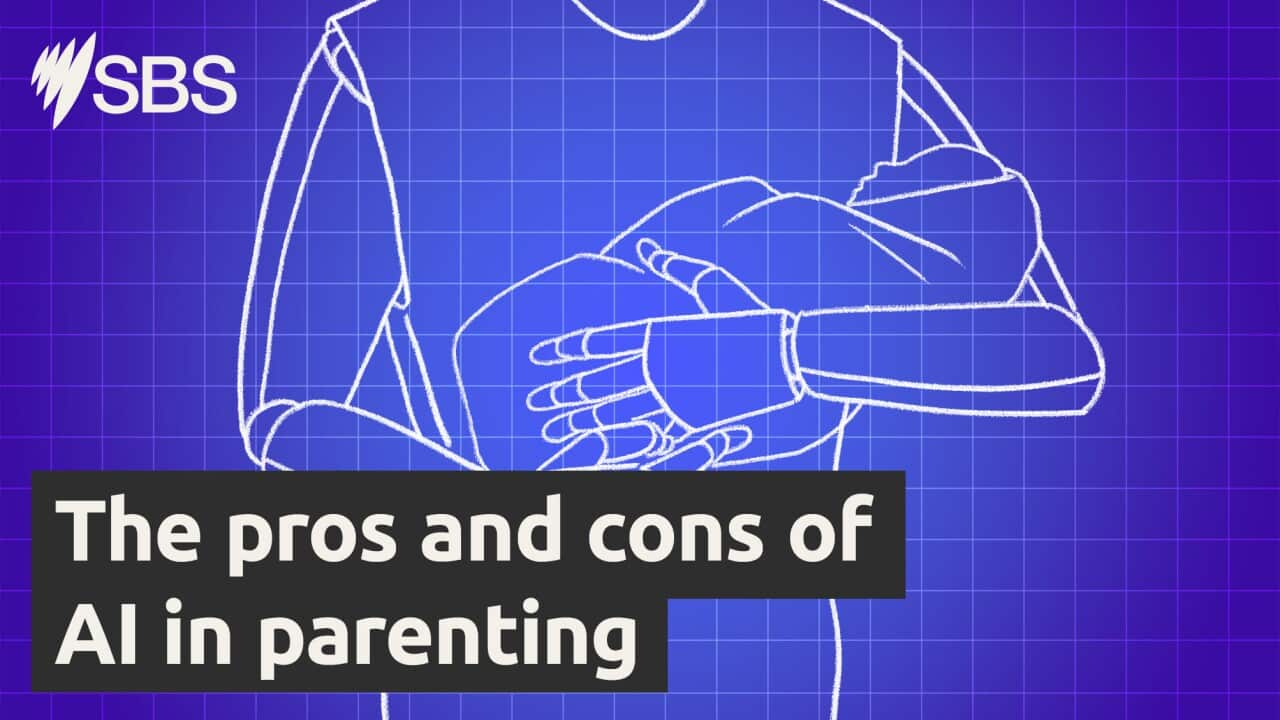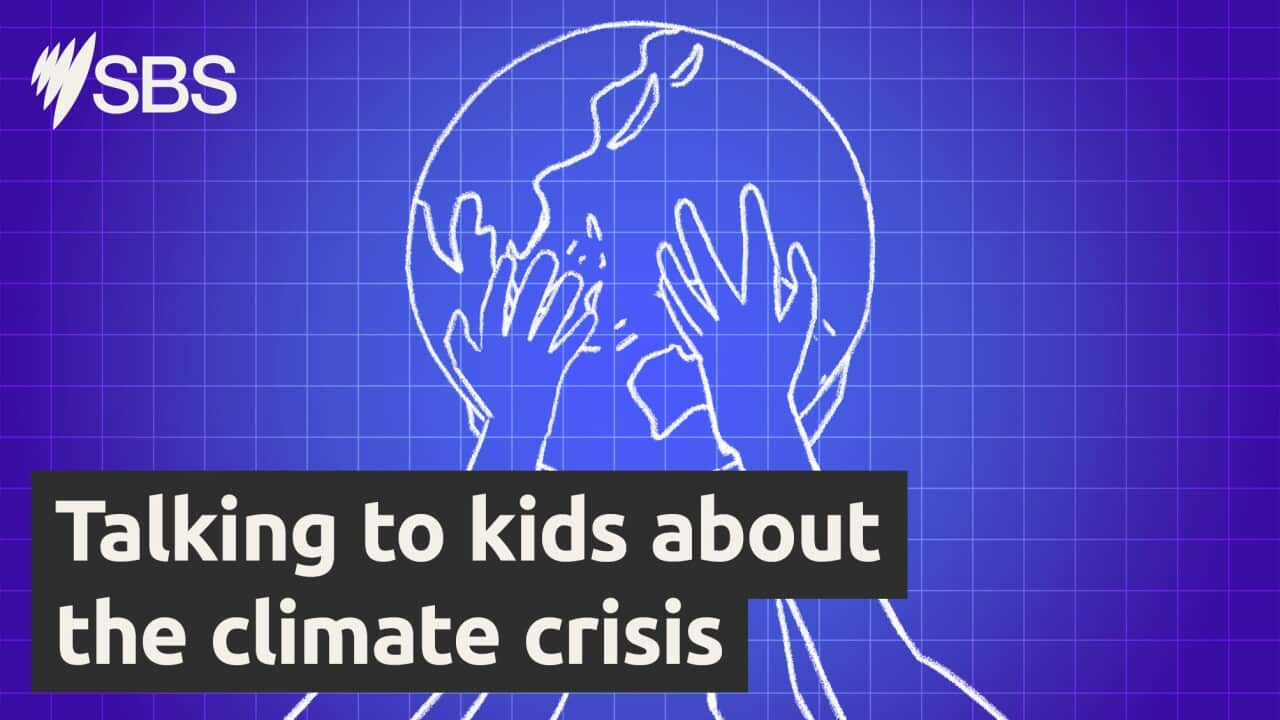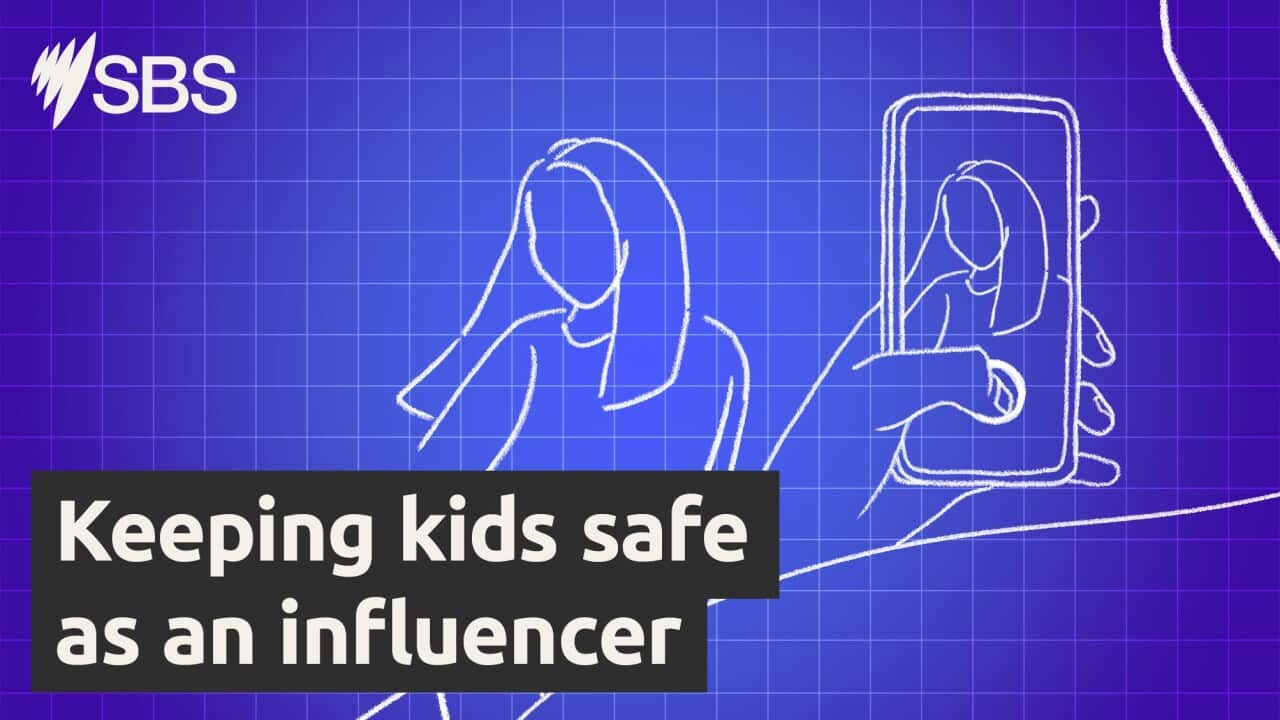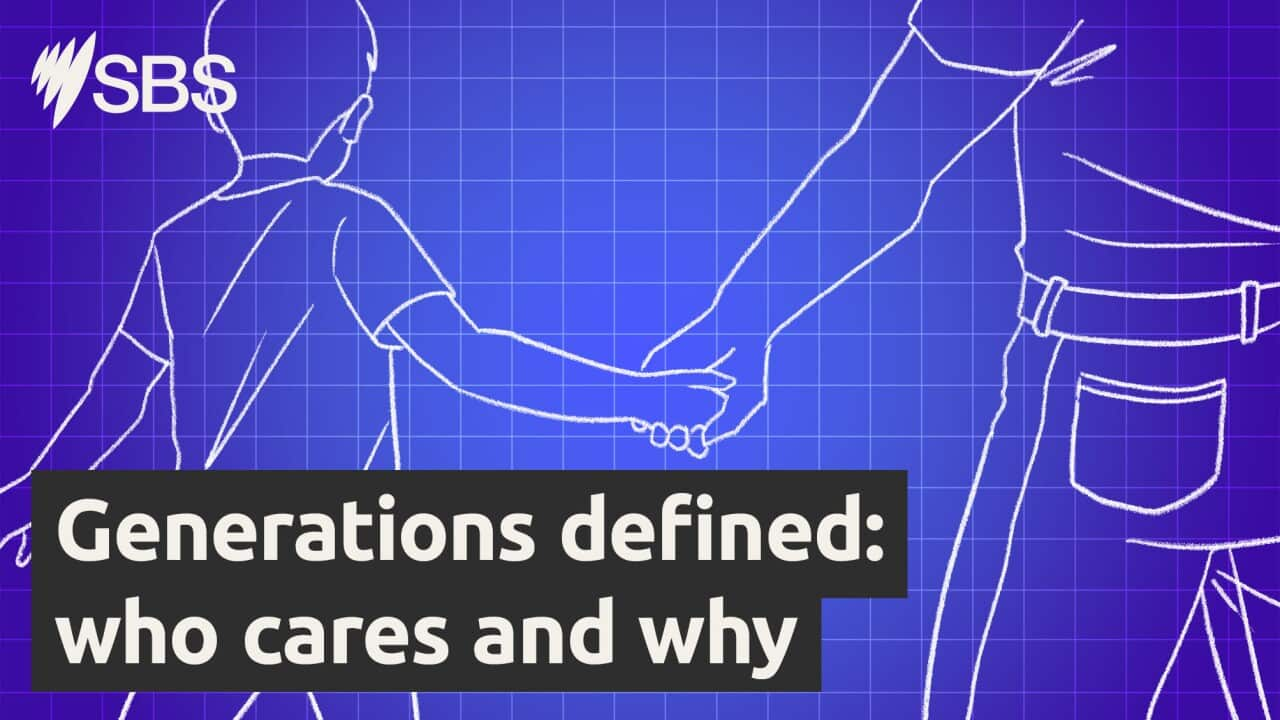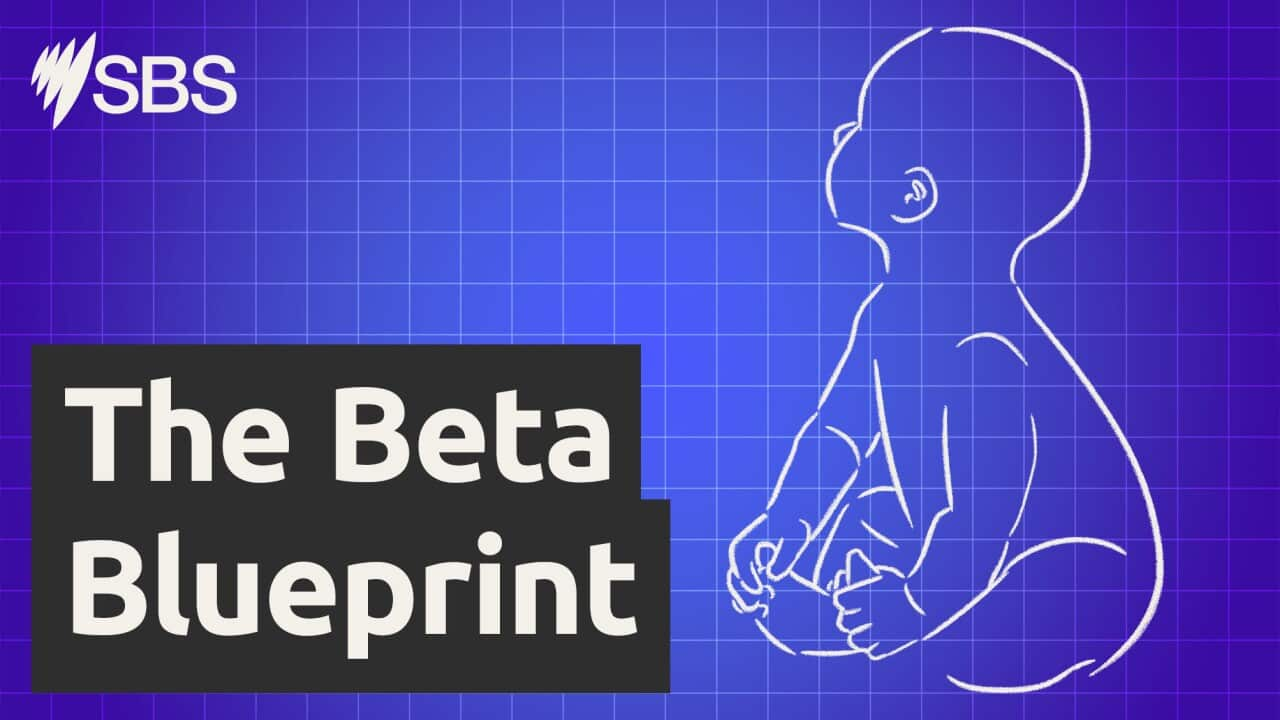Listen to Australian and world news, and follow trending topics with SBS News Podcasts.
TRANSCRIPT
Verity Tuck: Let's be hopeful that the machines can do all of the grunt work while we can be creative and have our feet in the soil.
*music*
SB: The incoming generations are expected to live in an era where artificial intelligence and automation are commonplace in everyday life. From education and workplaces to healthcare and entertainment. In this episode of the Beta Blueprint, I’ll be chatting with Verity Tuck and Mike Fraser. Life partners and business partners, they’re raising two young kids while also building an AI-assistant for parents.
*music*
SB: Welcome Verity and Mike. Let's start with the AI assistant you're developing - can you tell me a bit about it?
Verity: So we have created an app called Goldie. It's I guess at a top line, it's an AI assistant for very busy families. In today's age, families are strung out. They've got multiple children, sometimes even just one child that has multiple extracurriculars, they go to school, you get six to 10 emails a week from school sometimes, birthday party invites, sporting fixtures. It's almost like you're their PA as a parent like you are running their schedule. Typically the mother of the family takes on the burden of a lot of this planning, organising in their head. So it puts it out there for the other partner or what we call copilot to get involved as well and be a lot more across all those things that you churn through at night and feel a little bit alone with. So what Goldie does is it takes those, the abundance of communications like school emails, WhatsApp messages, birthday party invites, and it summarises it in the app using AI and it puts it into a schedule for you automatically. And then between us, we can assign accountability or responsibility for each event. You can also add reminders and tasks associated to events. So it's really there to take out all of that middle part of reading all the school newsletters, like processing it in your brain, then actioning things that need to be actioned in terms of the admin and reminders.
SB: Ok, so you’re both clearly in a position where you are interested in adopting new technologies, what draws you to them?
Verity: We've both come from a background of digital marketing and digital advertising. So I think maybe we're more on the end of early adopters, but we're both very, I guess I don't think we're out there. We are not risky people. We as parents, we want the safety of our kids and our data to be forefront in anything we use. So I think if you go in with those cornerstones covered of safety for parents, I think they're more likely to adopt it. But yes, we're definitely on a curve of, we're needing to do more education for parents to explain, it's not out there to get you.
SB: So for those who are a bit unsure or hesitant about some of these emerging technologies - can you explain how they're mainly being used at the moment?
Verity: The biggest adoption has been in enterprise level. So in businesses, so a lot of people may have seen it being used in corporate spaces where they work, and this is all about chopping out the mundane, repetitive tasks. A lot of software that businesses use now have it just built in, but a lot of the work that AI, the big large language models, a lot of it's done in the background. Some of it you just don't see, which is kind of the beauty of it. We're seeing more and more come through in Google search. Everything's summarised at the top with AI pulling the best bits from everywhere. I think you start to see it bubble up in lots of places, especially if you're on a computer day to day doing your work. If you're not then I think you won't as much right now. What do you think?
Mike: Yeah, I think it's been around a lot longer than everybody knows. Definitely in the enterprise space there's a lot more use for it, especially repetitive tasks. Recommendation engines on the most used platforms around the world have probably been using it.
Verity: Customer service as well.
Mike: So yeah, I think it's been around a lot longer. Like we touched on before that I think those use cases for the everyday person of being few and far between and probably why we're seeing such an aggressive growth now is because all the big players are sort of coming out with new utilities, tools to harness it for en masse as a customer.
SB: With that aggressive growth, are there any risks associated with AI that people need to be aware of?
Verity: I think it's having a healthy level of skepticism generally of these products always going to be healthy, I think. So anything or anyone taking your data or anything that you are writing out there, you just knowing the facts around how that data's being stored and how it's being used, whether it's being used to train engines and things like that, whether you've opted into that. I think a lot of us have gotten used to not reading terms and conditions. So if you're concerned, definitely I would urge you to read terms of service.
Mike: Yeah, I think we both try to think about, hope that the people who are developing it always have the sort of best intentions at the forefront. Undoubted, it would be naive to think that even from some of the stuff that we've seen with image manipulation, video, it's pretty advanced and we'll only get more advanced in the future and it's happening at a speed that's pretty unprecedented I think in terms of learning and generating content that may or may not be true. So I think always have to be careful using LLMs and tools that are well tested, more universal I think is a good start. Making sure privacy and your data is always being either removed once you've finished with it. It's also not being used to train other AIs, I think, unless you've asked it to . But yeah, I hope the majority of use cases are really about helping us rather than the negative sides of it.
SB: And you’ve got two children aged five and eight. I’ve heard of companies developing smart toys like AI-enabled robots, have you introduced them to anything like that?
Verity: No, no toys, no tech as much as any parent we struggle with the general rules around screen time. But that was a big part of the moving from big city to coastal regional life was trying to slow it all down in their childhood because yeah, it does from what we can see, tween and teen life just gets more and more complicated with these sorts of things, more pressures because a lot of their peers are using it and that's just having a device. So I guess our kids probably won't know a world that is different to the one with AI in it. So whilst we're seeing the big change ourselves now, it would just be there and already doing all of that hard, mundane, repetitive work. And I'm hopeful that, that means they'll have more time, space, to be a human as well. The reason machines do that stuff is because they don't have feelings and empathy and things like that. And we're on this earth basically for connection and to create connections with other humans. So maybe it will mean less time at a screen and more time in nature. Let's be hopeful that the machines can do all of the grunt work, while we can be creative and have our feet in the soil, I am a bit hopeful that it won't just keep grinding them down into more and more screen time.
Mike: There's no doubt, I was thinking about this the other day. It's probably the kids growing up not knowing a world without AI I think is kind of interesting when you think about it historically, where we were with the internet, and I don't want to sort of labour on my age, but it is one of the, it's the next big moment where we grew up not knowing a world without the internet and a mobile phone that could kind of do everything. Whereas our parents before that probably had none of that, colour TV was probably an exciting change and I think that will bring a load of positives and just like anything, a load of challenges that we need to be really careful of. I also hope that we don't lose our creative spark. I think there is, relying on a system like AI to help us is great, but when it sort of overtakes the creative process and takes the fun out of building something and learning something, hopefully that will just get deeper and deeper as opposed to forgetting a whole way of thinking. Hopefully.
SB: Well you've both described your AI assistant as a way to free up mental space, I guess to be more creative, do you expect other products like yours to be popping up?
Verity: Definitely the crossover of parenting and AI, it's a no-brainer in many respects and we're seeing competitors pop up everywhere. In terms of kids, I'm not sure, maybe I'm just nostalgic and want to keep some of that real innocence in the way they play and open-ended play and outdoor play. I hope not. I hope not. Especially around the toy, early development stages. I hope they can go to nature programs and all of that. But I think for adults especially, it's a safer place. They can understand the implications and what they're hopefully getting out of it and also what data they're putting into it.
Mike: Yeah, I think for us we felt like parents were a bit of a forgotten user base in terms of where technology had focused. Obviously huge focus in SaaS, enterprise and potentially broader consumer markets. People probably think that parents are niche in terms of an audience, but actually huge. So we see a good opportunity for us to play a role in their lives and no doubt, as Ver said, there are other products doing some really interesting things and we hope to play a small part of parents' lives in the future.
SB: And we spoke a bit before about how AI is being used and some of the risks associated with it, do you have any other advice for people who are interested in adopting some of these new tools?
Verity: I think we've got to be careful and I would say just know what you are giving up and how much control you would like in your schedule, in your household and anything that you adopt I guess as a parent in terms of running your family or having anything around the kids as well is understanding what data you're giving and what you're getting back or what the benefits are.
Mike: Yeah, take baby steps into the world of AI and let it grow and mature as you grow and mature in the knowledge as well.
Verity: As businesses providing an AI service, we also have a job to do to manage customer's expectations. So with all this emerging technology and a lot of talk around it, you can all of a sudden expect so much from it. AI and in particular LLM, so large language models, they're still relatively novel tools and depending on your familiarity with them, everyone's expectations are different. So some people expect a hundred per cent accuracy of what's going to come back and that's not necessarily how the tech works. And because we're so nuanced as human beings and we understand all the gray areas, whereas machines don't necessarily. So that's an interesting point. I think as part of what Mike said in terms of learning and growing with this technology is just the expectation around what it can do for you. Just I guess tempering that.
SB: Yeah I think that’s important. I know of friends, for example, who are using things like Chat GPT essentially as a search engine now despite that room for error.
Verity: You've still got to use your own filter as a human being.
Mike: It's a really prevalent example of how our creativity can quite quickly and the truth can quite quickly be manipulated just by not fact checking the source. And I think that I would be unsurprised if a lot of people aren't applying the same logic of moving from a search engine to Chat GPT for example. Because I mean that's kind of how it's marketed too, is that it is a replacement of that. The question is just where is that information coming from? So I think that's when we talk about creativity in our children, there is something exciting about doing it from scratch and not using anything no matter what you're doing, whether it's finding out the truth about penguins or how to build the most incredible Lego, those two experiences will be quite different in the future I think. And so some of the magic of just not knowing and discovering it yourself can then be applied to so many other components of your life. Whereas if maybe you are supplementing that with AI, you kind of lose the magic of and the struggle of solving it yourself. So hopefully we don't lose that magic and struggle of life is hard, it's meant to be and that some of the greatest sort of wins you'll have in your life are going through the pain of solving a problem.
SB: And just quickly, before we wrap up, for people who are wanting to learn more, what would you suggest they do?
Oh, there's loads of great podcasts on it. So it depends what kind of format you like to listen to. But there's lots of little 20 minute excerpts of, can machines have empathy and stuff, which is quite interesting topics to think about. Depends how deep you want to go, how technical, but if you're more like me, I like to just have a play with things. So a lot of these apps like Goldie, they have free trials, no credit cards needed. Go and have a play with it, see what it's capable of doing and just have a bit of fun. It is meant to be, it obviously is meant to solve a problem, but with Chat GPT, you can have a bit of fun asking about itineraries for travelling and jokes and things like that. I would just say experiment is always the best way to learn.
SB: That was Verity Tuck and Mike Fraser. I’m Sophie Bennett and you’ve been listening to the Beta Blueprint.
In the next episode I'll be speaking with an prominent figure in the online parenting space Sean Szeps, all about how he's navigating raising kids while working in social media.
